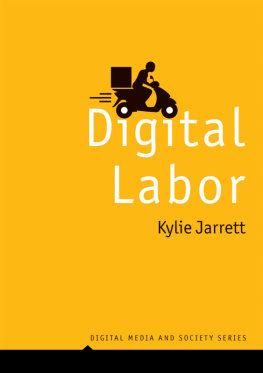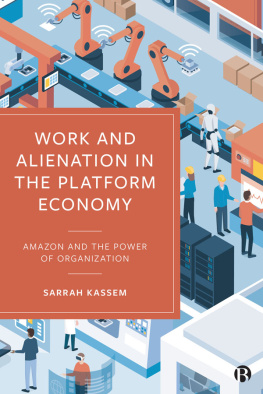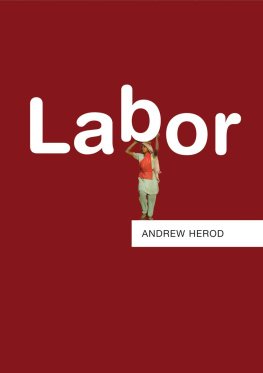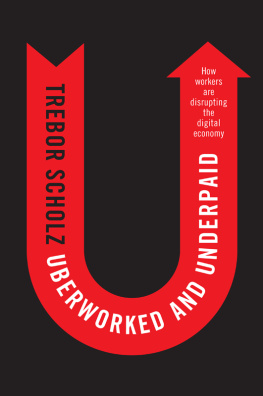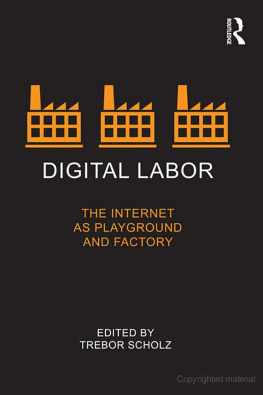
Series Title
Digital Media and Society Series
- Nancy Baym, Personal Connections in the Digital Age, 2nd edition
- Taina Bucher, Facebook
- Mercedes Bunz and Graham Meikle, The Internet of Things
- Jean Burgess and Joshua Green, YouTube, 2nd edition
- Mark Deuze, Media Work
- Andrew Dubber, Radio in the Digital Age
- Quinn DuPont, Cryptocurrencies and Blockchains
- Charles Ess, Digital Media Ethics, 3rd edition
- Terry Flew, Regulating Platforms
- Jordan Frith, Smartphones as Locative Media
- Gerard Goggin, Apps: From Mobile Phones to Digital Lives
- Alexander Halavais, Search Engine Society, 2nd edition
- Martin Hand, Ubiquitous Photography
- Robert Hassan, The Information Society
- Kylie Jarrett, Digital Labor
- Tim Jordan, Hacking
- D. Bondy Valdovinos Kaye, Jing Zeng and Patrik Wikstrm, TikTok: Creativity and Culture in Short Video
- Graeme Kirkpatrick, Computer Games and the Social Imaginary
- Tama Leaver, Tim Highfield and Crystal Abidin, Instagram
- Leah A. Lievrouw, Alternative and Activist New Media
- Rich Ling and Jonathan Donner, Mobile Communication
- Donald Matheson and Stuart Allan, Digital War Reporting
- Nick Monaco and Samuel Woolley, Bots
- Dhiraj Murthy, Twitter, 2nd edition
- Zizi A. Papacharissi, A Private Sphere: Democracy in a Digital Age
- Julian Thomas, Rowan Wilken and Ellie Rennie, Wi-Fi
- Katrin Tiidenberg, Natalie Ann Hendry and Crystal Abidin, tumblr
- Jill Walker Rettberg, Blogging, 2nd edition
- Patrik Wikstrm, The Music Industry, 3rd edition
Digital Labor
kylie jarrett
polity
Copyright Page
Copyright Kylie Jarrett 2022
The right of Kylie Jarrett to be identified as Author of this Work has been asserted in accordance with the UK Copyright, Designs and Patents Act 1988.
First published in 2022 by Polity Press
Polity Press
65 Bridge Street
Cambridge CB2 1UR, UK
Polity Press
101 Station Landing
Suite 300
Medford, MA 02155, USA
All rights reserved. Except for the quotation of short passages for the purpose of criticism and review, no part of this publication may be reproduced, stored in a retrieval system or transmitted, in any form or by any means, electronic, mechanical, photocopying, recording or otherwise, without the prior permission of the publisher.
ISBN-13: 978-1-5095-4519-3
ISBN-13: 978-1-5095-4520-9(pb)
A catalogue record for this book is available from the British Library.
Library of Congress Control Number: 2021951318
by Fakenham Prepress Solutions, Fakenham, Norfolk NR21 8NL
The publisher has used its best endeavours to ensure that the URLs for external websites referred to in this book are correct and active at the time of going to press. However, the publisher has no responsibility for the websites and can make no guarantee that a site will remain live or that the content is or will remain appropriate.
Every effort has been made to trace all copyright holders, but if any have been overlooked the publisher will be pleased to include any necessary credits in any subsequent reprint or edition.
For further information on Polity, visit our website: politybooks.com
Table of Contents
Guide
Pages
Acknowledgments
Digital Labor was researched and written through a series of lockdowns during a global pandemic. These were emotionally challenging times as our worlds shrunk and became riddled with new fears and challenges. The book inevitably bears the traces of the isolation and anxieties of this context. It also bears the traces of the forms of solidarity and meaningful digitally mediated exchanges that were a feature of this grim period. It is these elements of lockdown life I wish to take with me as we (hopefully) emerge from under the shadow cast by Covid and which I want to acknowledge here. I am, of course, very grateful to all my colleagues whose insights have shaped my research and who have been instrumental in the making of this book, not least as it depends so much upon their excellent empirical studies. As with most things in this pandemic, though, these traditional considerations must temporarily take a back seat as I recognize the personal connections that have made the labor of this book possible.
I want to say a huge, heartfelt thank you to the Brexit in Space WhatsApp group comprised of Mary Gilmartin, Eoin OMahony, Sheamus Sweeney, Jorie Lagerwey, and Niamh Puirsil. Hilarious and heartfelt, the banter, love, and care experienced here and during the occasional illegal bag-o-cans on the canal got me through the long dark days of this pandemic. You are the very best of people.
Much gratitude also goes to the 3-Legged Stool WhatsApp Gavan Titley and Stephanie Rains. We have been colleagues for what feels like forever and you never cease to encourage, support, and make me laugh. Thank you for all you have done to keep me sane these many years, especially the gossipy bits.
The other group of people whose presence (and prosecco) bolstered my flagging spirits was the Ballybough Pride of Place Community Group Laura Williams, Ray McSweeney, Damo Byrne, and Aideen Leonard. As my people are known to say, everybody needs good neighbors, and I clearly have these in abundance.
The most important group to acknowledge, though, is the great number of newly christened essential workers who continued to put themselves at risk to provide health and care services, sell us food, deliver goods, repair and clean, collect and process waste, or manufacture and prepare essential items. Workers in these jobs deserve everyones gratitude and respect. Many of these workers are also the digital laborers who figure in this study, and I thank them for keeping everything afloat while so many of us had the privilege of staying safely at home.
Now more than ever I am grateful to have all these people in my world to help me live a rich life even when locked in my house.
Kylie Jarrett
Defining Digital Labor
Adorned in the teal livery of Deliveroo, Thiago Cortes rode his bike onto the quays running along the River Liffey in Dublins city center one late August night in 2020. It was about 10.30 and the streets were quiet as a Covid-19 pandemic lockdown was in effect. Considered an essential worker, platform delivery riders such as Cortes were one of the few signs of life in the city. Like many other international students, Cortes worked for Deliveroo to meet the high costs of living in Dublin, riding his bike through the wet and windy city streets as a self-employed contractor for an average of 10.50 an hour, but sometimes for less. He had just completed what was likely to be his last delivery of the night and his fiance expected him home as usual about 11 p.m. He was not to arrive. As he attempted to turn onto North Wall Quay, he was hit by a car traveling at speed. The car, its driver, and passengers then fled the scene. Despite being rushed to hospital, Thiago Cortes did not survive his injuries (Lynch 2020; Malekmian 2020). A few nights later, friends and fellow Deliveroo riders held a vigil both in memoriam and as a protest about the unsafe conditions experienced in their work, holding the platform to account. Deliveroo rejected this call, claiming that riders were at the heart of Deliveroo and we prioritise rider safety (Pollak 2020). At the same time, a crowdfunding campaign was set up on GoFundMe to raise money to repatriate Cortess body to Brazil.
Next page
